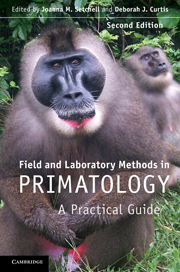Crossref Citations
This Book has been
cited by the following publications. This list is generated based on data provided by Crossref.
Kappeler, Peter M.
van Schaik, Carel P.
and
Watts, David P.
2012.
Long-Term Field Studies of Primates.
p.
3.
Swedell, Larissa
2013.
The Evolution of Primate Societies. Edited by John C.Mitani, JosepCall, PeterKappeler, Ryne A.Palombit, and Joan B.Silk. xiv + 730 pp. Chicago, IL: University of Chicago Press. 2012. $145.00 (cloth), $50.00 (paper), $7‐40.00 (ebook)..
American Journal of Human Biology,
Vol. 25,
Issue. 4,
p.
571.
2014.
Using the Biological Literature.
p.
297.
Lewis, Rebecca J.
2017.
The International Encyclopedia of Primatology.
p.
1.
Nanninga, Gerrit B.
Côté, Isabelle M.
Beldade, Ricardo
Mills, Suzanne C.
and
Fusani, L.
2017.
Behavioural acclimation to cameras and observers in coral reef fishes.
Ethology,
Vol. 123,
Issue. 10,
p.
705.
Lewis, Rebecca J.
2018.
The International Encyclopedia of Biological Anthropology.
p.
1.
Higham, James P.
and
Dominy, Nathaniel J.
2018.
The promise of primatology fulfilled?.
American Journal of Physical Anthropology,
Vol. 166,
Issue. 4,
p.
783.
HONGO, Shun
2018.
Camera Trapping in Primatology.
Primate Research,
Vol. 34,
Issue. 1,
p.
53.
Ellwanger, Amanda L.
and
Lambert, Joanna E.
2018.
Investigating Niche Construction in Dynamic Human-Animal Landscapes: Bridging Ecological and Evolutionary Timescales.
International Journal of Primatology,
Vol. 39,
Issue. 5,
p.
797.
2019.
Studying Primates.
p.
177.
Nowak, Katarzyna
Barnett, Adrian A.
and
Matsuda, Ikki
2019.
Primates in Flooded Habitats.
HE, Gang
YANG, Haitao
PAN, Ruliang
SUN, Yewen
ZHENG, Pengbin
WANG, Jinghua
JIN, Xuelin
ZHANG, Jingjie
LI, Baoguo
and
GUO, Songtao
2020.
Using unmanned aerial vehicles with thermal‐image acquisition cameras for animal surveys: a case study on the Sichuan snub‐nosed monkey in the Qinling Mountains.
Integrative Zoology,
Vol. 15,
Issue. 1,
p.
79.
Andrews, Kristin
2020.
How to Study Animal Minds.
Devan-Song, Anne
Walden, M. A.
Moniz, Haley A.
Fox, Justine M.
Low, Mary-Ruth
Wilkinson, Emma
Buchanan, Scott W.
and
Karraker, Nancy E.
2021.
Confirmation Bias Perpetuates Century-Old Ecological Misconception: Evidence Against ‘Secretive’ Behavior of Eastern Spadefoots.
Journal of Herpetology,
Vol. 55,
Issue. 2,
Sherman, Julie
Unwin, Steve
Travis, Dominic A.
Oram, Felicity
Wich, Serge A.
Jaya, Ricko L.
Voigt, Maria
Santika, Truly
Massingham, Emily
Seaman, Dave J. I.
Meijaard, Erik
and
Ancrenaz, Marc
2021.
Disease Risk and Conservation Implications of Orangutan Translocations.
Frontiers in Veterinary Science,
Vol. 8,
Issue. ,
Strier, Karen B.
2023.
A Companion to Biological Anthropology.
p.
300.
Prescott, Mark J.
2023.
Nonhuman Primate Welfare.
p.
57.





